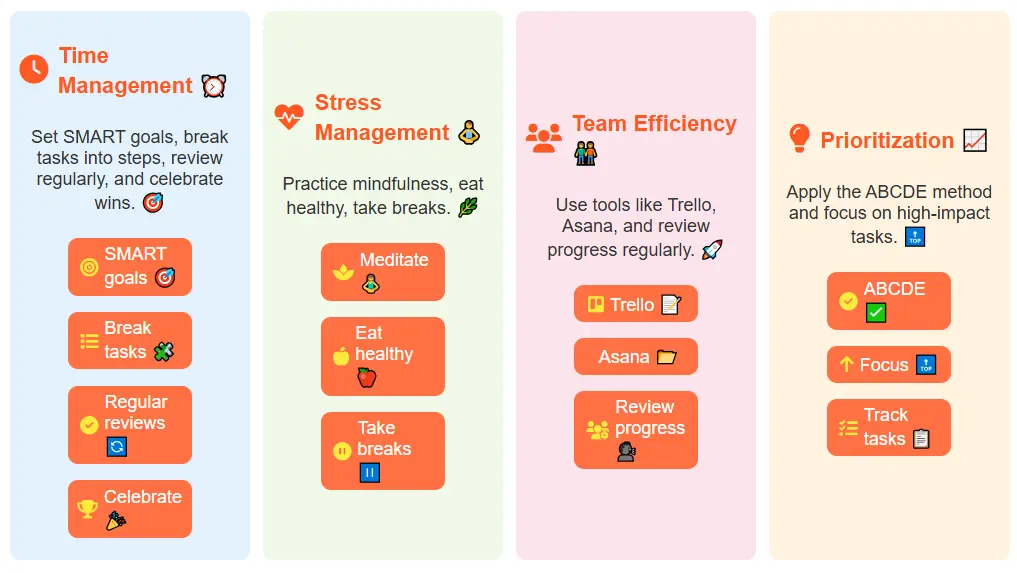Productivity Tips for Beginners, Students, and Professionals
Published: 14 Jan 2026
How can I increase productivity? Many of us ask when struggling to meet deadlines or stay focused. Studies show that improving productivity can boost efficiency by up to 60% (Source: Harvard Business Review). Whether you’re a student balancing studies, a beginner starting, or a professional aiming for excellence, mastering productivity tips can make a difference.
Tanveer’s proven strategies for boosting productivity offer actionable advice, covering practical tips from setting goals to using tools to help you work smarter.

By reading this article, you’ll discover proven techniques to achieve more in less time. Think of it as building a well-oiled machine; each tip enhances your workflow. Let’s move and transform how you approach tasks.
Common Tips To Increase Productivity
These are universal tips everyone should follow to boost productivity.
1. Start with Clear Goals
- Think of goals as the roadmap to your destination. Without clear directions, you might wonder. I’ve learned this firsthand while managing multiple projects; setting specific, measurable goals gave me a clear sense of purpose and direction.
- Start by defining your goals and breaking them into smaller, actionable steps. For example, instead of saying, “I’ll study today,” say, “I’ll study chapter one for two hours.
2. Prioritize Tasks with the Eisenhower Matrix
- Not all tasks are created equal. The Eisenhower Matrix helps you categorize tasks into four quadrants: urgent/important, important but not urgent, urgent but not necessary, and neither urgent nor important. This method enables you to focus on high-priority items, delegate less essential tasks, and eliminate distractions.
- I’ve used this method to cut through the noise and focus on what truly matters. For example, preparing for a client presentation falls under the category of urgent/important, while organizing my inbox is less critical. This approach feels like organizing your brain; only the essentials stay.
The key is not to prioritize what’s on your schedule, but to schedule your priorities. Stephen Covey
3. Avoid Multitasking
- Multitasking may seem productive, but research shows that it can lower efficiency by up to 40%. I tried handling emails, meetings, and reports simultaneously but made more mistakes.
- Focusing on one task at a time is like sharpening a knife; it might take longer, but the results are far better. Begin by silencing notifications and dedicating specific time blocks to individual tasks.
4. Take Regular Breaks
- Pushing through work without breaks can backfire. I discovered the Pomodoro Technique when I felt overwhelmed studying for exams. I stayed refreshed and productive by working for 25 minutes and then taking a 5-minute break.
- Think of your brain as a muscle; it performs better when you give it time to recover. Try stepping away for a short walk or stretching during breaks; they’re game-changers.
5. Organize Your Workspace
- A disordered desk is like a confused mind; it’s hard to concentrate. I noticed a huge productivity boost when I kept my workspace clean and organized.
- Removing distractions like old papers or unnecessary gadgets felt like clearing a mental fog. Invest in storage solutions or spend five minutes tidying up at the end of each day. A clean space truly assists a clear mind.

6. If > Then Thinking for Better Decisions
- “If > Then” thinking is a game-changer for building productive habits. This method uses cues to trigger action. For example, “If I finish my morning coffee, I’ll spend 20 minutes planning my day.”
- I applied this to my fitness routine: “If I close my laptop at 5 PM, I’ll head out for a 15-minute walk.” This cue-action pairing made it easier to stick to my goals. It’s like setting up dominoes; once the first one falls, the rest follow effortlessly.
These tips are straightforward, but using them consistently can significantly enhance your productivity. Which one will you start with?
Advanced Tips for Students and Professionals
Being productive as a student or professional can feel like balancing on a tightrope. The right strategies and tools can help you stay steady and move forward. Here are some advanced tips tailored to the challenges you might face.
1. Use Technology Wisely
- As a student, I found apps like Notion helpful for organizing notes, and Evernote is great for saving ideas. These tools make studying easier and reduce stress.
- For professionals, tools like Trello and Slack are excellent for managing tasks and staying connected with teams.
Select tools that align with your needs and enhance your workflow efficiency.
2. Manage Time Effectively
Time blocking has changed how I approach my day. It’s like setting appointments with yourself for specific tasks.
- Students can manage time by treating study tasks like appointments. Scheduling specific blocks for homework, revisions, and projects avoids last-minute cramming. Following this, during my studies, I reduced my stress and improved my focus, helping me stay on top of assignments without feeling overwhelmed.
- Professionals can manage their time by time-blocking tasks, such as meetings. Dedicating specific time slots for emails, projects, and breaks can boost productivity. In my career, this approach has helped me balance my work responsibilities, ensuring tasks are completed without overloading me.
3. Learn to Say No
- I used to overcommit, thinking it would help me grow, but it only led to burnout. Saying no is like installing a protective shield around your time and energy.
- Set boundaries by politely declining tasks that don’t align with your priorities. It’s not selfish, it’s necessary.
4. Optimize Energy Levels
- Productivity isn’t just about working harder; it’s about working smarter. I always keep a water bottle and healthy snacks nearby to maintain focus.
- Staying hydrated and eating right feels like fueling a high-performance engine; you’ll run longer and smoother. Add proper sleep to the mix, and you’re unstoppable.
You don’t have to be great to start, but you have to start to be great. Zig Ziglar
Tips for Maintaining Long-Term Productivity
Maintaining long-term productivity is about finding a rhythm that works for you, staying flexible, and nurturing your mind and body. From my personal experience, it’s these minor, consistent changes that build sustainable success.
| Tip | Description | Personal Experience |
|---|---|---|
| Embrace Lifelong Learning and Adaptability | Stay curious and open to learning new skills and knowledge. Adapt to changes by seeking growth opportunities. | Balancing multiple writing commitments taught me the importance of taking breaks. Incorporating short nature walks into my day enables me to return to work refreshed and motivated. |
| Regularly Evaluate Your Habits and Strategies | Periodically assess what’s working and what’s not. Adjust your approach to align with your evolving goals. | I schedule a monthly review to evaluate my progress and adjust my routines. For example, switching from late-night writing to early mornings boosted my creativity and focus. |
| Balancing multiple writing commitments taught me the importance of taking breaks. Incorporating short nature walks into my day enables me to return to work refreshed and motivated. | Cultivate optimism by focusing on progress, not perfection. Schedule downtime to recharge and reset your mind. | Balancing multiple writing commitments taught me the importance of taking breaks. Incorporating short nature walks into my day facilitates me to return to work refreshed and motivated. |
| Set Clear, Achievable Goals | Break larger objectives into smaller, actionable steps to maintain focus and motivation. | When planning content for Master Self Now, I break down each project into manageable tasks. This method keeps me on track and prevents me from becoming overwhelmed. |
| Build a Supportive Network | Surround yourself with like-minded individuals who encourage and inspire growth. | Engaging with other writers and readers through forums and webinars has expanded my perspective and motivated me to deliver valuable content. |
| Interesting Facts |
|---|
|
Conclusion
So, guys! It’s time to wrap up. Applying these productivity tips to beginners, students, and professionals can transform your work approach. Clear goals, innovative time management, and thoughtful breaks all contribute to boosting efficiency and reducing stress. Start tiny, stay consistent, and watch your productivity soar.
Based on my experience, I highly recommend starting with the Pomodoro Technique; it’s simple, effective, and ideal for building focus while avoiding burnout. Give it a try and see how it transforms your workflow.
Ready to take the next step? Pick one tip from this article, implement it today, and share your progress in the comments below!
FAQs About Productivity Tips
Find quick answers to common questions about boosting your capability and maximizing your efficiency.
Start with a quick win: tackle a tiny, urgent task to build momentum. Completing it boosts confidence and sets the tone for the rest of your day.
Try deep breathing for instant calm and break tasks into smaller steps. Focus on one small action to reduce stress and regain control.
Pros: They enhance organization, streamline tasks, and reduce stress.
Cons: Over-reliance can be distracting if too many apps are used. Choose wisely for maximum benefit.
Studies suggest that it takes 21 to 66 days to form a new habit, depending on the level of consistency and complexity. Start small and stay persistent to make it stick.
Take the Next Step
- Share your favorite productivity tips in the comments below.
- Subscribe to our newsletter for more productivity insights and updates.
- Explore our other articles for expert tips on time management, goal setting, and stress management.

- Be Respectful
- Stay Relevant
- Stay Positive
- True Feedback
- Encourage Discussion
- Avoid Spamming
- No Fake News
- Don't Copy-Paste
- No Personal Attacks

- Be Respectful
- Stay Relevant
- Stay Positive
- True Feedback
- Encourage Discussion
- Avoid Spamming
- No Fake News
- Don't Copy-Paste
- No Personal Attacks





